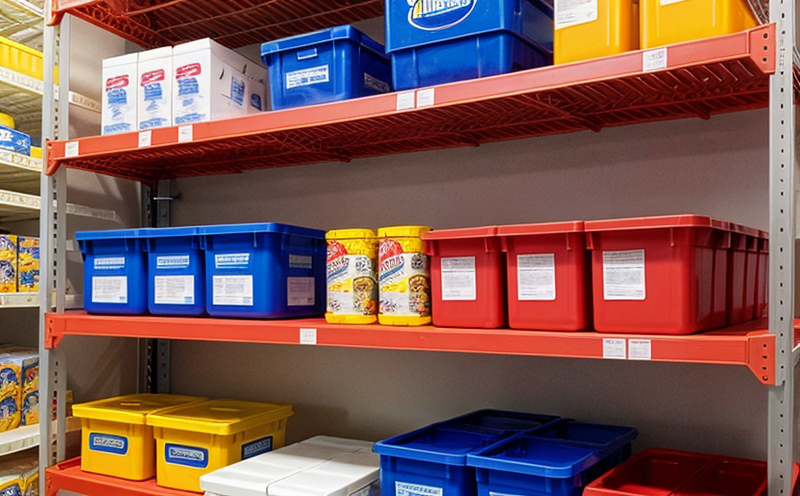ISO 107064 Shelf Life Profiling in Dairy Alternatives
The ISO 107064 standard is a cornerstone in the evaluation of shelf life and stability of dairy alternatives, providing a robust framework for understanding how these products behave over time. This service focuses on profiling the shelf life of plant-based milk substitutes using this internationally recognized standard. Our approach ensures that manufacturers can maintain product quality throughout distribution and storage, aligning with consumer expectations.
Shelf life profiling involves a comprehensive series of tests designed to assess the stability and degradation mechanisms of dairy alternatives under various environmental conditions. These conditions include temperature, humidity, light exposure, and other stressors relevant to real-world scenarios. The primary goal is to identify critical points in time when product quality begins to decline, thereby informing optimal storage and distribution practices.
Our laboratory adheres strictly to ISO 107064 guidelines, which emphasize the importance of selecting appropriate test specimens representative of commercial products. Specimen preparation involves replicating real-world conditions as closely as possible while controlling variables such as packaging type and initial microbial load. This meticulous approach ensures accurate and reliable data.
The testing process begins with an initial characterization phase where the chemical composition, physical properties, and microbiological profile of the dairy alternative are determined. Following this, stability studies are conducted at different temperatures to simulate various storage conditions encountered during distribution. These tests may include accelerated aging methods that provide insights into long-term product behavior.
Microbiological evaluation plays a crucial role in shelf life profiling by monitoring changes in bacterial populations over time. This helps identify potential spoilage organisms and assess the effectiveness of preservatives used in formulations. Additionally, sensory assessments conducted by trained panelists evaluate any alterations in color, texture, flavor, or appearance that could indicate product deterioration.
Chemical analysis complements microbiological evaluations by quantifying key components such as proteins, fats, sugars, and vitamins. Changes in these parameters over time provide valuable information about the ongoing chemical reactions occurring within the product matrix. Understanding these transformations allows for better prediction of shelf life extension strategies that can be implemented during formulation development.
Finally, sensory analysis provides qualitative feedback from trained evaluators who assess aspects like taste, aroma, mouthfeel, and overall acceptability. This subjective evaluation helps bridge gaps between objective measurements obtained through instrumental methods and consumer preferences regarding freshness perception.
The results generated from this comprehensive shelf life profiling service offer valuable insights into the stability characteristics of dairy alternatives under different environmental conditions. By adhering to rigorous standards like ISO 107064, we ensure that our clients receive accurate data they can rely upon when making critical decisions related to product quality assurance and improvement initiatives.
Industry Applications
- Packaged plant-based milk substitutes (e.g., soy milk, almond milk)
- Dairy-free yogurt alternatives
- Creamer products for coffee beverages
- Baby formula and infant nutrition supplements containing dairy components
- Milk replacers for livestock feed formulations
- Other specialty beverages or nutritional drinks derived from plant sources
At Eurofins, we pride ourselves on offering unparalleled expertise in food and feed testing, including specialized services like ISO 107064 shelf life profiling for dairy alternatives. Our team of experienced professionals leverages cutting-edge technology and methodologies to deliver precise and actionable results that meet or exceed industry standards.
We employ advanced analytical techniques such as High Performance Liquid Chromatography (HPLC), Fourier Transform Infrared Spectroscopy (FTIR), and Gas Chromatography Mass Spectrometry (GCMS) to provide comprehensive profiles of chemical composition changes during shelf life testing. Our commitment to accuracy extends beyond instrumental capabilities; it also encompasses thorough understanding of biological factors influencing product stability.
Eurofins maintains state-of-the-art facilities equipped with ISO 107064 compliant environments tailored specifically for dairy alternative research and development projects. These controlled conditions allow us to simulate realistic storage scenarios while maintaining strict adherence to international guidelines.
Our extensive network of laboratories across Europe enables quick turnaround times, ensuring timely delivery of reports to meet tight project deadlines. Additionally, our global presence facilitates seamless collaboration between European partners and clients worldwide, promoting a holistic approach to food safety and quality assurance.
Use Cases and Application Examples
The application of ISO 107064 shelf life profiling in dairy alternatives is extensive across multiple sectors. Here are some key examples:
- Beverage manufacturers: Understanding the impact of different packaging materials on product quality can help optimize packaging design for extended shelf life.
- R&D teams: Identifying critical factors affecting stability allows innovation in formulation adjustments aimed at enhancing longevity without compromising taste or texture.
- Supply chain management: Predicting degradation patterns helps logistics planners plan efficient routes and storage facilities to minimize waste.
- Quality control departments: Regular shelf life testing ensures compliance with regulatory requirements while maintaining consistent product quality standards.
In one notable case study, a leading plant-based milk company utilized our ISO 107064 profiling service to extend the shelf life of its products by identifying optimal storage temperatures and modifying packaging to reduce oxygen ingress. As a result, they observed significant reductions in spoilage rates and increased customer satisfaction.





